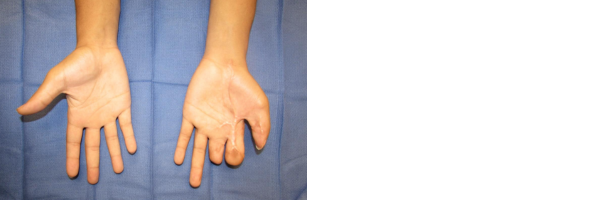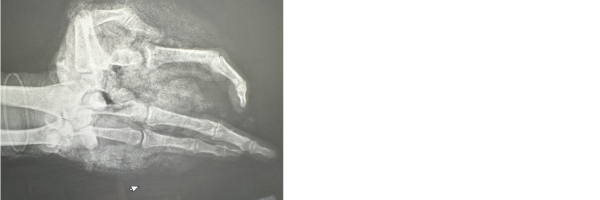
Expert Advice from an Orthopedic Hand Surgeon to Prevent Holiday Hand Injuries
As the Fourth of July approaches, the skies are set to light up with the vibrant colors of fireworks. While these displays are a celebration staple, they come with their own risks, especially to our hands. Understanding the common injuries and preventative measures is crucial for a safe and enjoyable holiday, so we asked Dr. Michael Gart, a Hand and Plastic Surgeon, for some information and tips.
Common Hand Injuries Related to Fireworks
During the Fourth of July holiday, there is a spike in hand-related injuries due to fireworks. In the Charlotte area alone, many patients are treated for finger and/or hand amputations each year.
Most fireworks incidents are to the hands and fingers, with burns representing more than 40% of all fireworks injuries.
Firework Injuries to Thumb and First Webspace
Young adults aged 15-19 and children aged 5-9 are most commonly affected by firework-related injuries. Mortars are the most common type of fireworks causing operative hand injury and can cause severe injuries if they explode while being held. These frequently involve the thumb and the first webspace, the area between the thumb and index finger.

Firework-related injuries can be profound and life-altering, resulting in loss of function despite our best efforts at care. They can range from superficial burns to mangling, limb-threatening injuries involving skin, muscle/tendon, blood vessels, nerves, and bone. In the case of amputation(s), this extensive soft tissue damage can prevent successful replantation.

Fractures and Dislocations from Firework Injuries
Fractures and dislocations at the base of the thumb are typical in firework injuries. Severe soft tissue damage or burns to the first webspace can significantly impair hand function if a contracture develops.
- Soft Tissue Damage: Extensive damage includes injury to skin, muscle, tendons, blood vessels, and nerves. This can result from direct trauma or severe burns.
- Burns: Burns: Range from superficial to full-thickness, potentially leading to significant scarring and functional impairment.
- Amputation: In cases of severe trauma, amputation might be necessary. Extensive soft tissue damage from the injury can hinder successful replantation, leading to permanent loss of function. Treating firework-related hand injuries is complex, often requiring multiple surgeries over an extended period.

Thankfully, the OrthoCarolina hand team includes trained hand specialists and plastic surgeons like Dr. Gart, along with specialized care centers such as the Reconstructive Center for Lost Limbs and the Brachial Plexus and Limb Paralysis Clinic and more to serve patient needs.
Preventing Hand Injuries
To minimize the risk of injury, let's explore preventive measures to ensure that your fireworks display lights up the sky, not in your hand.

Safety Precautions for Using Fireworks
If you do choose to light your fireworks, here are some safety tips to help you celebrate without endangering yourself (or your hands!):
- Read all labels and safety instructions before lighting fireworks.
- Never consume drugs or alcohol when handling fireworks.
- Use eye protection when lighting fireworks.
- Never place your body over a fireworks device when lighting and immediately retreat to a safe distance after lighting.
- Do not allow children to handle fireworks; supervise teenagers.
- NEVER hold a firework that is not meant to be held.
- Light only one firework at a time.
- Do not try to re-light a firework that does not go off (a "dud"). Wait 10-20 minutes and place it in a bucket of water to avoid accidental discharge.
- Keep a bucket of water or hose nearby in case of fire or burn.
- Teach children that fireworks are explosives and can be far more dangerous than they appear.
- Children should watch fireworks from afar and never handle them directly.
By following these guidelines, you reduce the risk of hand injuries and ensure everyone's safety, free from the risk of hand injuries. On behalf of the OrthoCarolina Hand Center, stay safe during the July 4 Holiday! Remember, the best celebration is a safe one!
Thank you to Dr. Michael Gart from OrthoCarolina's Hand Center for providing this blog information!
Sources:
- Huang and Pledger, 2023 Fireworks Annual Report. United States Consumer Product Safety Commission. www.cpsc.gov
- Canner JK, et al. US Emergency Department Visits for Fireworks Injuries. J Surg Res. 2014
- Sandvall BK, Keys KA, Friedrich JB. Severe Hand Injuries from Fireworks: Injury Patterns, Outcomes, and Fireworks Types. J Hand Surg 2017
This information is provided as an educational service and is not intended to serve as medical advice. If you are seeking specific orthopedic advice or assistance, please consult with your OrthoCarolina physician or locate one in your area through OrthoCarolina’s website at www.OrthoCarolina.com.
Back




Leave a Comment